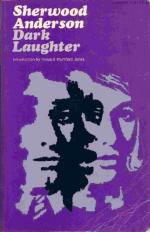|
This section contains 303 words (approx. 2 pages at 300 words per page) |

|
Anderson's techniques embroiled the literary world in controversy ever since his first book was published, and Dark Laughter was no exception. Critical response ranged from "astonishingly bad" (Kim Townsend) to "one of the most profound novels of our time" (H.
L. Mencken). Simplicity was Anderson's hallmark, and perhaps the reason so many critics distrusted his literary achievement. In some instances in Dark Laughter, the conversations are so ordinary that the reader has to re-read the sentence to be sure he read it correctly.
In attempting to understand Anderson's craft and why he was both loved and detested by critics, it is useful to place him in the context of the literary movements of the time. The era of the epic novel had passed. Readers, disenchanted with the social orders portrayed by the likes of Henry James and Leo Tolstoy, were turning to experimental writers. British writers Virginia Woolf...
|
This section contains 303 words (approx. 2 pages at 300 words per page) |

|




